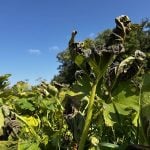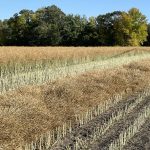COLINTON, Alta. – Farmers in parts of China face similar problems as those in Canada, says the leader of an agriculture delegation to this country.
The group of 19 bureaucrats from the agriculture departments of six Chinese provinces and the Chinese autonomous region of Inner Mongolia hope to take the best of Canadian agriculture policy and practices back to their country, where they can improve sustainable agriculture production.
“The Canadian government and society pays a lot of attention to maintaining a good environment we have learned through lectures and visits here in the last two weeks,” Mr. Hu said through an interpreter during a Canadian International Development Agency funded tour of northern Alberta farms where operators have fenced off stream banks, added solar watering systems and planted shelterbelts.
Read Also

Trade war may create Canadian economic opportunities
Canada’s current tariff woes could open chances for long-term economic growth and a stronger Canadian economy, consultant says — It’s happened before.
“We can learn from the practices Canada has in environmental management. The problems in regions of China and Inner Mongolia are similar to ones Canada used to face.”
George Chu, a retired Prairie Farm Rehabilitation Administration official and the Canadian leader of the tour, said the goal was to help the Chinese develop practical agriculture policies and farm programs based on policy.
“They have an opportunity to study what we’re doing here,” said Chu, who was on the PFRA organized tour of farms, auction markets and water tank-loader facilities.
Most of the policy discussions focused on sustainable agriculture.
“The issues are very similar,” Chu said.
“They have the same problems with soil degradation and problems in agriculture.”
Madam Zhang, an agriculture department administrator, said she was impressed with Canadian conservation programs and was interested in how Canadian farmers have moved from cultivation to minimum tillage practices.
“Conservation tillage practices in Canada is very good for us back in China,” she said through an interpreter.
“We have realized the problem and try to improve practice, expand conservation and tillage on the land.”














